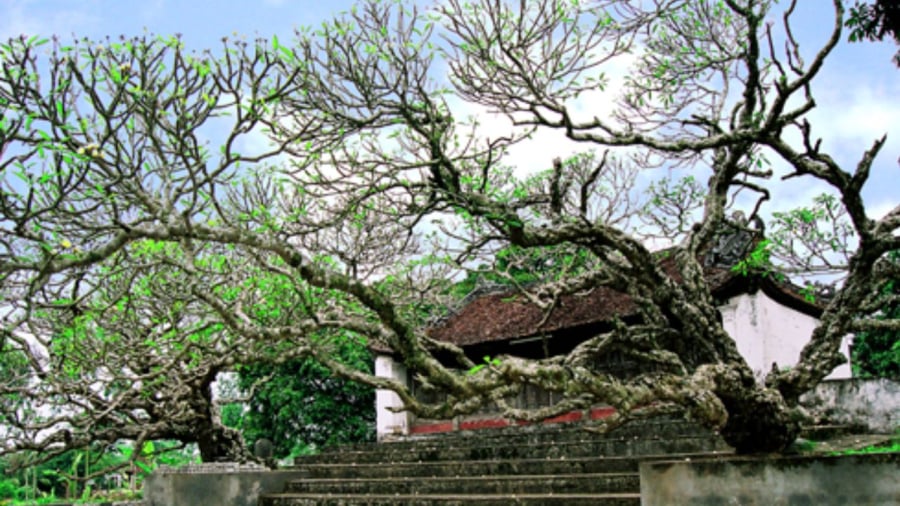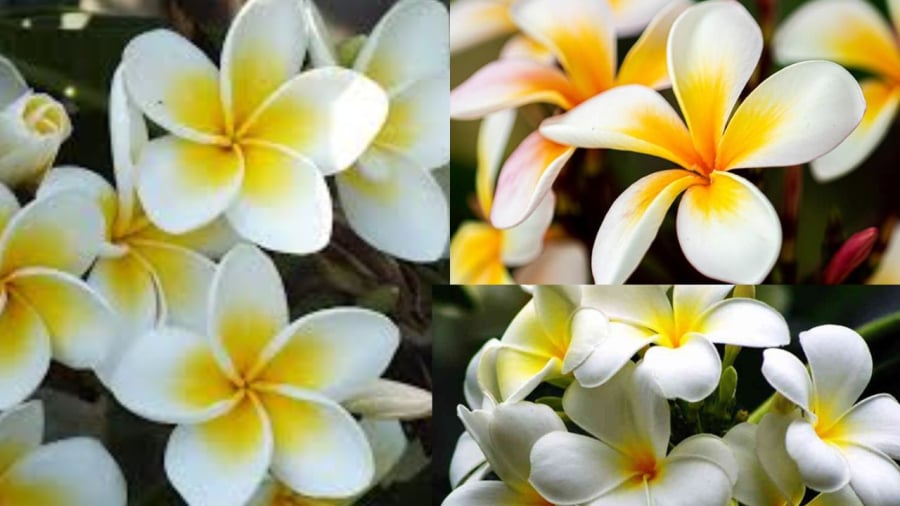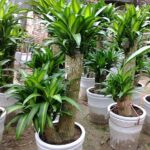Flowers hold a sacred and noble significance in spiritual worship culture. Their beauty and fragrance symbolize the sincerity of the homeowner’s intentions. Flowers are believed to bring good luck and well-being, offering a way to decorate the worship space and uplift the spirits of those present.
However, not all flowers are deemed suitable for offering. Traditionally, it is believed that only beautiful and fragrant flowers with no negative connotations or potential for misunderstanding are acceptable. One flower that is often avoided in worship practices is the “hoa đại” (translated as “magnolia flower”).
Magnolia is a resilient and low-maintenance ornamental plant with upward-facing flower clusters. Its flowers are a beautiful blend of creamy white and yellow, exuding a strong, sweet fragrance. The sturdy, grayish-gray stems and deep green, robust leaves of the magnolia tree create a striking contrast. This tree is commonly found in the compounds of temples, shrines, and religious sites.

Magnolia trees are a familiar sight next to temples, shrines, and religious sites.
## Why Is Burning Incense with Magnolia Flowers Discouraged?
Visitors to Buddhist temples may encounter majestic magnolia trees, with some specimens towering above humans, their canopies spreading several meters across, and their gnarled, ancient-looking branches reaching skyward. The sight of these trees, with their leaves shedding to reveal upward-facing flower clusters, is captivating.
In Buddhism, the magnolia tree holds a special significance. Its beauty conveys a sense of otherworldliness, and when the leaves fall, the exposed flower clusters high above create a sense of sacredness and vastness within the space of traditional religious architecture. In Buddhist culture, the magnolia tree is considered a “tree of heavenly mandate,” believed to possess a life force that embodies the soul of the universe.
According to ancient beliefs, this tree has the ability to draw life force from the sky and transmit it to the earth and water, fostering a fulfilling life. In various cultures, the magnolia holds sacred meanings. In India, for instance, magnolia flowers are woven into garlands for weddings, symbolizing good luck and happiness. In Laos, the flower represents sincere joy and happiness.

However, magnolia flowers are not used for incense offerings.
In Vietnamese folk beliefs, however, the magnolia flower is associated with women of ill repute. The shape of the flower resembles female genitalia, which, according to ancient customs, makes it unsuitable for incense offerings. Moreover, magnolia flowers, when plucked, are challenging to arrange in a vase and are typically floated in water, where they quickly wilt and rot.
The intense fragrance of fresh magnolia flowers can also be overwhelming in a worship space. Additionally, the magnolia tree contains a special toxin, and its sap is toxic if it comes into contact with the skin. In the context of feng shui, offering flowers with toxic properties is considered unlucky.
*This information is for reference and contemplation only.
Does Planting Ironwood Melaleuca in Front of the House Good for Family Feng Shui?
“Peach trees are a common sight in Vietnam, with their vibrant blossoms and lush foliage, but is it auspicious to plant them in front of your home? The delicate beauty of the peach tree holds a special place in Vietnamese culture and feng shui practices. Its presence is believed to bring good fortune and prosperity, but there are considerations to take into account before planting this auspicious tree in your front yard.”
Sure, I can assist with that.
## Eat Balut to Ward Off Bad Luck: Do These Two Things to Make Sure the Jinx is Lifted
With a deft hand and an eye for detail, I craft words that dance across the page, capturing the essence of your brand and bewitching your audience. The humble balut egg, a delicacy in many Asian cultures, is often associated with folk beliefs of dispelling bad luck. To harness this purported power, two crucial steps must be followed with precision.
The Top 3 Home-Related Don’ts for July: Superstition or Savvy?
In many cultures, the seventh month of the lunar calendar is considered a time to avoid undertaking any significant home-related projects. Superstition dictates that any renovations or significant changes to one’s home during this period may result in unforeseen troubles and challenges. It is believed that by refraining from such activities, one can avoid any potential negative consequences and maintain harmony within their living space.
Is It Good for Family Feng Shui to Plant a Crape Myrtle Tree in Front of the House?
The Queen of the Night, the enigmatic Epiphyllum oxypetalum, is a captivating cactus with an alluring presence. With its ethereal beauty and enchanting blooms, it captivates those who encounter it. This exotic epiphyte, native to the tropical rainforests of South America, has earned its regal moniker due to the exquisite nature of its nocturnal blossoms. Under the cloak of darkness, the Queen of the Night reveals her true splendor, unfurling her delicate petals to the moonlight in a breathtaking display of nature’s magic.



































